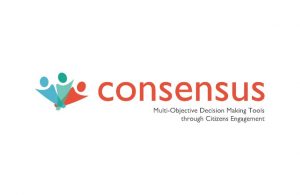
About
Policy makers are faced on daily basis with different policy choices and objectives that, more often than not, are subject to inherent conflicts, implying underlying trade-offs that need to be taken into account. For example, if a policymaker wishes to construct a road, he has to consider a number of factors amongst others, the cost of the investment, its socio-economic return in terms of social cohesion and economic trade, environmental aspects, safety considerations and so on. How can a policymaker be certain that he has calibrated these different elements in a balanced way? In what could be potentially the solution, the CONSENSUS project will strive to model existing real world user cases and deliver the tools that can, in an easy and comprehensive manner, provide policy makers with optimal choices based on a number of relevant criteria. This investigation is meant to cover two important real world user-cases in the project: one dealing with Biofuels and Climate Change (EU Renewable Energy Directive), and the other dealing with the Trans-European Transport Networks (TEN-T).
Last but not least, one of the goals of Consensus is to involve citizens’ in the policymaking scheme since their input can potentially become highly valuable in various stages, from the gathering of the necessary data, through formulating public opinion as one of the objectives in the model, to eventually playing the role of exploring the attained tradeoffs and contributing to their weighing.
Objectives
CONSENSUS aims to simplify, predict and visualise the consequences of decisions in the policy making process by:
- Maximising the impact of policies by accurately predicting policy implementation effects in multiple domains
Consensus employs multi-objective optimisation methods in order to identify the rich set of optimal alternatives. This information will allow the policy makers to confront the realistic side-effects of their decisions, eventually leading to maximisation of impact.
- Empowering citizens and echo the increasingly growing importance of public opinion in policy making
This will be achieved through an analysis of public opinion as it is currently formed in social media and crowdsourcing platforms. Gamification techniques will also be used to incentivise people to participate.
- Mapping policy implementation alternatives to actual policy decisions
Consensus fosters human – computer interaction mechanisms that will visually highlight the consequences of certain options and based on users’ feedback and will further suggest solutions that are more appropriate.
- Educating citizens on policy issues and increasing transparency in decision making
Consensus attempts to educate the citizens about the consequences of each decision by providing them with a tool that will enable them to visualize the various optimal alternatives.
